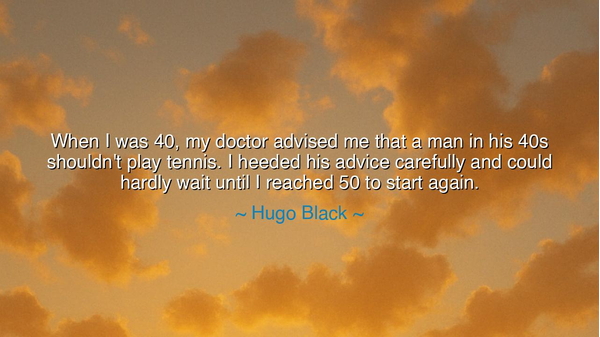
When I was 40, my doctor advised me that a man in his 40s
When I was 40, my doctor advised me that a man in his 40s shouldn't play tennis. I heeded his advice carefully and could hardly wait until I reached 50 to start again.






When Justice Hugo Black, a titan of the American Supreme Court, spoke the words, “When I was 40, my doctor advised me that a man in his 40s shouldn’t play tennis. I heeded his advice carefully and could hardly wait until I reached 50 to start again,” he revealed not merely wit, but a profound teaching wrapped in humor. Beneath the surface of this playful remark lies a philosophy of endurance, patience, and the defiance of limits imposed by others. It is a reminder that though time may weigh upon us, the spirit remains free, and the heart of youth can burn even in later years.
The origin of this saying belongs to a man known not for sport, but for law and judgment. Hugo Black served as a Justice for over three decades, shaping the fabric of American constitutional life. His work was heavy, his mind burdened by the gravity of law. And yet, in speaking of tennis, he revealed another side: the joy of play, the love of movement, the refusal to let age dictate the boundaries of the human will. In jesting that he would wait until fifty to return, Black declared that true vitality is not destroyed by passing years, but renewed by them.
The ancients too believed in this truth. Cicero, in his essay On Old Age, wrote that the later years of a man’s life could be rich not in the power of the body, but in the wisdom of the mind and the joy of the spirit. Yet Black reminds us that the body, too, can be reclaimed if the heart is willing. Age may slow us, but it cannot silence us unless we surrender. His words stand as a torch to those who think their best days are gone: life always offers another chance, another season, another court upon which to play.
Think of the example of Arthur Ashe, who continued to inspire the world even as illness weakened his body. Though his health faded, he never surrendered his love for tennis, or for teaching, or for living with dignity. In the same way, Hugo Black’s humor reflects a spirit that refuses to be caged by numbers or diagnoses. It is not the years that determine a man’s strength, but the resilience of his will and the joy with which he embraces life’s contests.
The lesson here is clear: do not let fear or caution steal your vitality. Take wise counsel, yes, but do not bury your passions simply because the calendar has turned. If a dream burns within you, it is not extinguished by age—it is waiting, like a seed beneath winter soil, to bloom again when you are ready. The doctor’s warning might have been sensible, but Black’s heart answered with resilience: he would pause, but he would not quit. And when the time came, he would step once more onto the court with laughter in his spirit.
What then shall we do? First, do not surrender your joys at the first sign of difficulty—adapt them, preserve them, and return to them when you can. Second, nurture a sense of humor about your limitations, for humor turns burdens into lightness and setbacks into stepping-stones. Third, embrace the long view of life: patience, not despair, is the secret weapon of the enduring soul. If one season of strength fades, prepare for the next, for time often restores what it once seemed to take away.
Thus, Hugo Black’s playful wisdom rings true: “I could hardly wait until I reached 50 to start again.” This is not the voice of resignation, but of triumph disguised as jest. It teaches us that vitality belongs not to the young alone, but to all who refuse to bow before age. May we too carry this spirit into our lives: laughing at obstacles, enduring with patience, and seizing every chance to begin anew. For the game is not over until we ourselves choose to lay down the racket.






AAdministratorAdministrator
Welcome, honored guests. Please leave a comment, we will respond soon